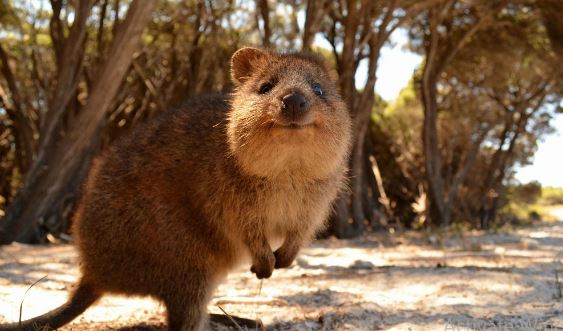
If you want to see these cuddly creatures you’ve got to travel to the land down under.
1. Quokka
Follow in the footsteps of Hollywood actor Chris Hemsworth and catch the ferry to Rottsnest Island in Perth. Here you will find these lovable marsupials that are the size of a domestic cat. You will see them scattered all over the former penal colony nibbling on leaves or balancing on their hind legs and taking in the scenery.
2. Echidna
It may look fierce, but this toothless creature that found all over Australia prefers the quiet life. An echidna relies on two key ways to fight off attackers – it rolls into a ball and uses its spines to frighten off other creatures, otherwise it uses its claws to dig a getaway tunnel. The echnida is also known for having a unique mating ritual. When a female is ready to mate it will be followed by up to 10 males and is known as an ‘echidna train’. Great places to spot echidna include Kangaroo Island and Tasmania.
3. Platypus
The first scientists to examine the platypus thought they were the victims of a prank. But as we now know, this semi-aquatic creature with a duck-like bill, webbed feet and dense fur is just another one of Australia’s unique creatures. Cuddly it may appear, but those webbed feet also come with venomous spurs. If you want to spot one in the wild, take a kayaking trip through the Derwent Valley in Tasmania where platypus are active through the warmer months of the year.
4. Wombat
These sturdy four-legged creatures come with powerful claws that help them burrow. They live on grass, herbs and roots. While common wombats are considered a nuisance by farmers, the Sydney Olympics chose to have a wombat as its mascot and there is an unofficial holiday called Wombat Day, which is observed on 22 October. Kangaroo valley in New South Wales and the East Coast of Tasmania are great places to spot wombats.
5. Koala
The sloth may be the world’s most laid-back creature, but koala has be to a close second. These fuzzy tree-living mammals, who will sleep for up to 18 hours a day rely heavily on eucalyptus leaves for nutrition. For not only are the leaves their food, but as these marsupials don’t drink that much water, they already rely on the leaves for moisture. Those cuddly leave munchers can be found on Kangaroo Island and along the Great Ocean Road in Victoria.
6. Tasmanian Devil
This former mainland native is now only found on Tasmania. Devils were hunted for their fur, which is why it is now endangered. It got its name through having a strong bite and is known for the ferocious way that it eats. You can view them at Saffire Freycinet in Tasmania.
7. Kangaroo
If you want to see Skippy the kangaroo on holiday, you have a good chance. As the number of kangaroo rose from 25.1 million to 34.4 million within a year. Kangaroos are the only large animals to use hopping as a means of locomotion. But it’s effective as they can close up speeds of 70km/h. Great places to see kangaroos include Hamilton Island, Flinders Ranges and of course Kangaroo Island, South Australia.

